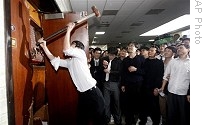voa标准英语2008-South Korean Political Minority Seeks Sit-in Sta
搜索关注在线英语听力室公众号:tingroom,领取免费英语资料大礼包。
(单词翻译)
South Korea's parliament is experiencing a extended period of paralysis1 that is getting increasing physical. Minority politicians have vowed2 to block a set of bills they oppose by any means necessary. So far they are keeping their word.About 50 members of South Korea's minority Democratic Party forced their way into the main voting hall of the country's parliament Friday and locked themselves in. Their aim was to prevent ruling party members from holding a plenary session that might have resulted in the passing of bills the Democratic party opposes.
South Korean television showed images of police dusting the plenary hall doors for fingerprints3, in hopes of narrowing down which specific Democratic Party members initiated4 the incursion into the hall.
The Democratic Party has 83 seats in South Korea's 298-member parliament. The ruling Grand National Party of South Korean President Lee Myung-bak controls 172 seats and easily outnumbers its opponents. The GNP has promised to pass a number of controversial measures, including a free trade deal with the United States.
 |
| A South Korean opposition5 Democratic Party member with a hammer beats a door to enter into a parliamentary committee room, Seoul, 18 Dec. 2008 |
Last week, clashes broke out as minority lawmakers sought to force their way into a committee room to disrupt the process of ratifying6 the U.S. free trade deal. Security guards opened up fire extinguishers on opponents of the deal as they hammered away at locked and barricaded7 doors. The damaged doors have since been replaced with reinforced steel, in anticipation8 of more physical conflict between the parties.
Democratic Party Chairman Chung Sye-kyun says the National Assembly has turned into a battleground, and he holds the president to blame.
He says the war now taking place in the assembly can be defined as a war initiated by President Lee. He says Mr. Lee is trying to take away the Parliament's role of limiting government power.
Chung and his allies object to several bills they have labeled "evil." The measures would enhance the ability of law enforcement to tap domestic phones, consolidate9 the power of major media companies, and tighten10 rules regarding how citizens post messages online. Democratic lawmakers say the bills put South Korea on a path to the authoritarian11 days of the country's past.
Cho Yoon-seon, spokeswoman for the ruling GNP, says it is the minority Democratic Party that is in the wrong.
She says the DP should stop destroying public facilities, and start participating normally in getting bills passed. She adds, the DP should apologize to the people as they showed contempt for parliamentary process.
It remains12 to be seen whether ruling party politicians will choose to engage in dialogue with opponents, or seek a more muscular approach. There is also a question of whether the conflict will remain contained within parliamentary buildings, or possibly manifest itself in broader public demonstrations13.
 收听单词发音
收听单词发音 




